Switzerland Residential Property Market Analysis 2025
Driven by a persistent imbalance between supply and demand, now supported by lower borrowing costs, sales prices in the Swiss housing market continue to rise, while rental inflation slows against the background of weaker employment and population growth trends.
This extended overview from Global Property Guide covers key aspects of Switzerland’s housing market and takes a closer look at its most recent developments and long-term trends.
Table of Contents
- Housing Market Snapshot
- Supply and Demand Highlights
- Rental Market
- Mortgage Market
- Socio-Economic Context
Housing Market Snapshot
Prices in Switzerland's residential property market continue to rise, driven by a persistent imbalance between supply and demand amid declining interest rates. In the third quarter of 2025, Wüest Partner's Transaction Price Index for privately owned apartments, published by the Swiss National Bank (SNB), recorded a 4.47% year-on-year increase (4.26% in real terms). Quarter-on-quarter, the index rose by 0.99%.
Italy's house price annual change:
Note: Switzerland House Price Index: Privately Owned Apartments (2000 = 100)
Data Source: Swiss National Bank.
Single-family homes showed a comparable trend, with a 4.61% year-on-year increase (4.39% inflation-adjusted) and a 0.82% gain from the previous quarter. Wüest Partner expects prices to continue rising throughout 2025, supported by easing interest rates and ongoing supply shortages, though the pace of growth is seen to moderate. Forecasts call for annual increases of 2.8% for privately owned apartments and 3.1% for single-family houses in 2025.
These expectations largely align with recent projections from UBS, which anticipate a mild slowdown in price momentum over the coming quarters, with nominal home price growth of around 3% in 2026, still outpacing both income and rent developments.
Despite signs of moderation, underlying market fundamentals remain firm. As experts from Raiffeisen note, "The high prevailing price dynamic is likely to continue for the time being. Because in addition to the interest-rate-driven strong demand, supply-side scarcity in the owner-occupied market remains large."
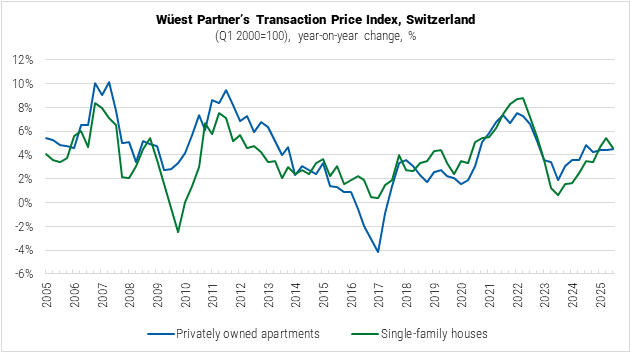
Data Source: Wüest Partner via SNB.
Regional data on asking prices further illustrates this momentum. The strongest annual growth for apartment prices was observed in Central Switzerland (5.22%) and the Lake Geneva region (4.79%). For single-family homes, Northwestern Switzerland and Central Switzerland led the market, posting year-on-year increases of 7.00% and 6.94%, respectively.
Regional price dynamic, Wüest Partner's Asking Price Index:
| Region | Privately Owned Apartments, Q3 2025 vs Q3 2024, % |
Single-family Houses, Q3 2025 vs Q3 2024, % |
| Zurich Region | 3.83% | 3.72% |
| Eastern Switzerland | 3.46% | 6.94% |
| Central Switzerland | 5.22% | 7.00% |
| Northwestern Switzerland | 3.94% | 4.17% |
| Bern Region | 1.27% | 3.11% |
| Southern Switzerland | 2.44% | 2.07% |
| Lake Geneva Region | 4.79% | 3.34% |
| Western Switzerland | 3.71% | 3.25% |
| Switzerland | 3.36% | 3.42% |
| Data Source: Wüest Partner via SNB. | ||
Zurich remains the most expensive city for apartment purchases. According to Wüest Partner's latest data for Q3 2025, average transaction prices reached CHF 22,350 (USD 28,057) per square meter, representing a 6.18% year-on-year increase. Geneva followed closely at CHF 21,450 (USD 26,927) per square meter.
Privately owned apartment prices in the five largest cities:
| Transaction price, CHF/sqm Q3 2025 |
Transaction price, USD/sqm Q3 2025 |
YoY, % Q3 2025 vs Q3 2024 |
|
| Zurich | CHF 22,350 | USD 28,057 | 6.18% |
| Bern | CHF 11,180 | USD 14,035 | -3.20% |
| Basel | CHF 13,550 | USD 17,010 | 4.07% |
| Lausanne | CHF 16,260 | USD 20,412 | 4.70% |
| Geneva | CHF 21,450 | USD 26,927 | 3.13% |
| Note: Exchange rate as of September 2025, USD 1 = CHF 0.7966. | |||
| Data Source: Wüest Partner. | |||
A similar pattern is evident in the single-family home segment, with Zurich and Geneva continuing to dominate the upper end of the market. As of Q3 2025, the national average transaction price for a single-family home stood at CHF 1,250,000 (USD 1,569,169), while Zurich approached CHF 4,368,000 (USD 5,483,304), almost three and a half times the national average. Geneva followed with an average of CHF 3,292,000 (USD 4,132,563).
Single-family house prices in the five largest cities:
| Transaction price, per unit, Q3 2025, CHF |
Transaction price, per unit, Q3 2025, USD |
YoY, % Q3 2025 vs Q3 2024 |
|
| Zurich | CHF 4,368,000 | USD 5,483,304 | 4.1% |
| Bern | CHF 2,211,000 | USD 2,775,546 | 1.4% |
| Basel | CHF 2,907,000 | USD 3,649,259 | 6.2% |
| Lausanne | CHF 2,990,000 | USD 3,753,452 | 13.4% |
| Geneva | CHF 3,292,000 | USD 4,132,563 | -3.7% |
| Note: Exchange rate as of September 2025, USD 1 = CHF 0.7966. | |||
| Data Source: Wüest Partner. | |||
Foreign buyers face specific restrictions when purchasing property in Switzerland. The Federal Act on the Acquisition of Immovable Property in Switzerland by Foreign Non-Residents (ANRA, also known as the Lex Koller) requires prior authorization from the competent cantonal authority. For certain categories of residential property, particularly holiday homes and serviced apartments, these authorizations fall under a national annual quota allocated to the cantons.
Authorization rules vary by canton, and further details are available through the Federal Office of Justice (FOJ) and the Federal Land Registry and Real Estate Law Office.
Supply and Demand Highlights:
Insufficient New Supply Deepens the Market Strain of Strengthening Demand
According to the Federal Statistical Office (FSO), Switzerland's housing stock comprised more than 1.80 million residential buildings and 4.84 million dwellings at the end of 2024. Multifamily apartment buildings account for approximately 58% of all dwellings, while single-family homes represent about 21%.
Switzerland remains predominantly a nation of tenants, with 58% of dwellings occupied by tenants or subtenants. Owner-occupied single-family homes account for 24% of the market, owner-occupied apartments for 12%, and the remaining 6% are occupied by cooperative members or provided rent-free.
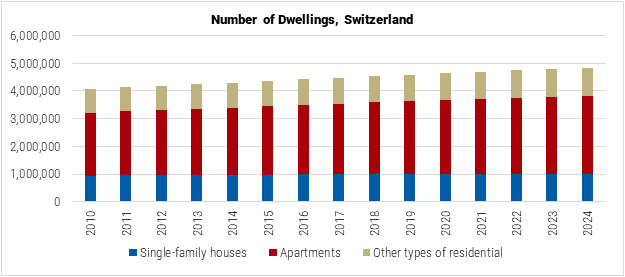
Data Source: FSO.
Between 2013 and 2018, an average of more than 51,000 new dwellings were completed annually. In recent years, however, construction momentum has slowed considerably. According to estimates by Wüest Partner, only 40,750 units were delivered in 2024, representing a 12.80% year-on-year decline. A moderate rebound is anticipated, with around 43,200 new units expected in 2025 and a further increase to approximately 48,500 units in 2026.
Planning activity has been rising again since mid-2022. This increase is now gradually appearing in the number of building permits, with the annual total nearing 40,000 in the second quarter of 2025. UBS links this renewed momentum to stabilization in construction prices, while cautioning that despite "the somewhat higher planning activity, it will take some time before building permits are reflected in supply".
This assessment aligns with the Q3 2025 market overview published by the Federal Office for Housing (FOH), which anticipates a housing rebound beginning in 2026: "A significant rise in completed housing in the current year is unlikely, but a trend reversal in 2026 appears realistic."
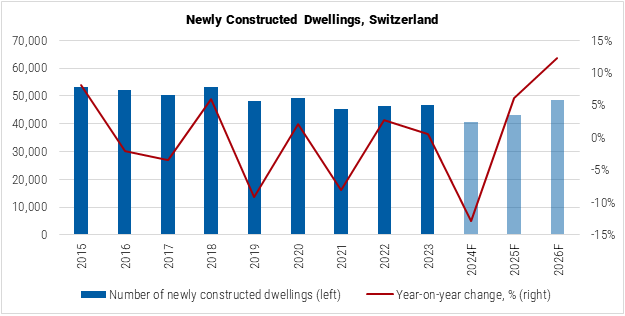
Data Sources: FSO, Wüest Partner.
Meanwhile, demand pressures continue to intensify. Switzerland's population grew by nearly 147,000 in 2023, driven primarily by net migration of around 139,000 people, including more than 50,000 Ukrainian nationals fleeing conflict. Although net population growth eased to roughly 88,800 in 2024, immigration remains a key driver of demand, particularly in urban regions.
"Against the backdrop of this structural demand, combined with a persistently weak expansion in supply, there are still no signs of excess demand easing," commented PWC.
The national housing vacancy rate, reported annually by the FSO, has fallen for four consecutive years. After peaking at 1.7% in 2020, it declined to 1.00%, or 48,455 units, in June 2025, its lowest level since 2013.
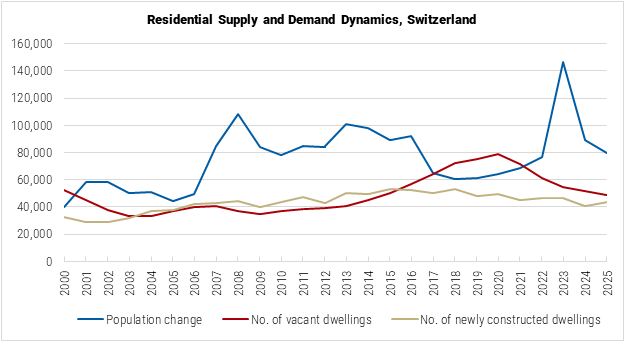
Note: The number of newly constructed dwellings and population change in 2025 includes Wüest Partner estimates.
Data Sources: FSO, Wüest Partner.
The decline has been especially pronounced in the rental market. In 2025, the number of unoccupied rental apartments fell by 8.0% year-on-year to 37,194 units, extending the tightening trend that began in 2021. Vacancies in the owner-occupied segment also resumed their downward trajectory following a temporary increase in 2023-2024 linked to elevated interest rates. The number of vacant units decreased by 2.5% year-on-year to 11,261.
Raiffeisen Switzerland noted: "The extremely low vacancy rate in the owner-occupied housing segment, which has been at a very low level for decades, declined again in 2025. This comes after it had previously risen slightly for two years, contrary to the trend in the rental market, due to interest-rate effects." The bank added that "[market dynamics point to] high absorption capacity of the owner-occupied market and a persistently large excess demand."
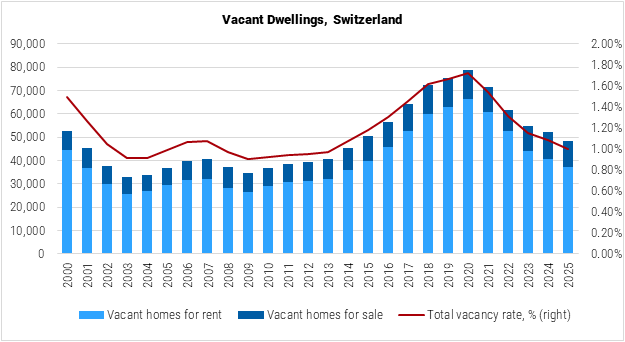
Data Source: FSO.
Regionally, the decline in available homes was most pronounced in Canton Ticino, where the share of properties on the market, whether for rent or sale, fell from 2.08% to 1.92%. The Lake Geneva region recorded the next largest decrease, from 0.96% to 0.83%.
Among individual cantons, Geneva again registered the lowest vacancy rate at 0.34%, followed by Zug (0.42%) and Zurich (0.48%). In total, 15 cantons reported vacancy rates below 1%. Jura (3.03%) and Solothurn (2.05%) had the highest rates and were the only cantons above the 2% threshold. Compared with the previous year, vacancy rates declined in 19 cantons, increased in six, and remained unchanged in Graubünden.
| Number of Vacant Units, June 2025 |
Vacancy Rate, June 2024 |
|
| Lake Geneva Region | 8,072 | 0.83% |
| Midland Switzerland | 14,630 | 1.39% |
| Northwestern Switzerland | 6,377 | 1.04% |
| Zurich Region | 3,815 | 0.48% |
| Eastern Switzerland | 7,845 | 1.09% |
| Central Switzerland | 2,780 | 0.65% |
| Ticino | 4,936 | 1.92% |
| Switzerland | 48,455 | 1.00% |
| Data Source: FSO. | ||
Rental Market:
Slower Growth Rate for Asking and Existing Rents
Strong demand for rental housing, fueled by limited supply in major centers and international immigration, continues to drive up rental rates across Switzerland; however, rental inflation slowed significantly in the second half of 2024 and has continued to stabilize in the three quarters of 2025. In Q3 2025, the nationwide asking rent index published by the SNB based on Wüest Partner data increased by 1.49% year-on-year, down from the 3.78% growth rate observed a year prior in Q3 2024. Regionally, the most pronounced annual growth was reported in Eastern Switzerland (2.58%), while Zurich, with the surrounding region and the Lake Geneva region, recorded more moderate increases of 1.83% and 0.42%, respectively.
Switzerland's rent price index:
Note: Switzerland's Rent Price Index, % change 1 yr
Data Source: OECD.
"The reasons for the slowdown in rent growth include reduced additional demand due to weakening employment and population growth, slightly higher construction activity, and already high asking rent levels that exceed the affordability threshold for many households," Wüest Partner's latest property market report explained. "The two reductions of the reference interest rate in 2025 also had a dampening effect. While its impact on asking rents is weaker than on existing rents, it nevertheless also curbs growth. For 2026, we expect asking rents across Switzerland to increase by +0.7% on average."
The mortgage reference rate (which is used to determine rent adjustments in existing agreements) was cumulatively reduced by 0.5 percentage points this year to its current standing of 1.25%. The latest housing market overview from the Federal Office for Housing (FOH) indicates the benchmark is expected to remain at this level for the time being.
Based on these developments, experts from Julius Bär also highlight moderation of the price dynamic for both new and existing rental contracts in their most recent report: "Developments in asking rents also point to stabilization following a period of strong rises. Meanwhile, rents for existing contracts are set to fall, given the two cuts to the reference interest rate this year."
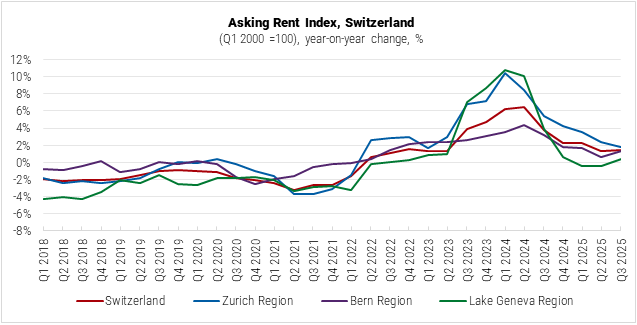
Data Source: Wüest Partner via SNB.
According to Wüest Partner, the median annual asking rent for apartments in Switzerland reached CHF 240 (USD 301) per square meter of usable space in Q3 2025, up from CHF 230 during the same period in 2024 and CHF 220 in 2023. Regionally, the highest asking rents were observed in Zurich (CHF 400 / USD 502) and Geneva (CHF 410 / USD 515).
Slower growth in rents compared to sales prices continues to translate into weaker potential performance of rental properties as investment assets. According to research carried out by Global Property Guide in September 2025, gross rental yields for residential units in Switzerland averaged 2.92%, down from 3.04% previously reported in October 2024. Regionally, the highest yields among the assessed submarkets were observed in the cantons of Valais (3.59%) and Fribourg (3.28%), while Zurich, Geneva, Bern, Vaud, Ticino, and Aargau all showed yields below 3%.
The latest report from Wüest Partner shows even lower estimates for prime properties in major metropolitan centers, with yields for rental apartments in this category ranging from 2.40% in Basel to 2.20% in Geneva and only 1.80% in Zurich, as of Q3 2025.
Overall, the rental segment of the housing market in Switzerland remains attractive to investors, however, according to experts. "The ongoing low interest rate environment is supporting demand for both upmarket owner-occupied housing and investment properties in Switzerland," believes Julius Bär. "While it is true that US tariffs could weigh negatively on user demand for commercial property in certain areas, the repercussions for the Swiss residential property market are likely to be limited for the foreseeable future."
Apartment asking rents in major centers:
| Median Annual Rent, CHF/per sqm Q3 2025 |
Median Annual Rent, USD/per sqm Q3 2025 |
YoY, Q3 2025 vs Q3 2024 |
|
| Zurich | CHF 400 | USD 502 | -4.8% |
| Bern | CHF 270 | USD 339 | 0.0% |
| Basel | CHF 260 | USD 326 | 0.0% |
| Lausanne | CHF 310 | USD 389 | 3.3% |
| Geneva | CHF 410 | USD 515 | -2.4% |
| Note: Exchange rate as of September 2025, USD 1 = CHF 0.79661. | |||
| Data Source: Wüest Partner. | |||
With the majority of households living in rented housing and a large share of rental dwellings owned by institutional landlords rather than private individuals (over 43% nationwide, according to the FSO data), government regulation of the rental sector remains a highly relevant issue for Switzerland, with key updates on changes in housing policies and tenancy law published by the Federal Office for Housing (FOH).
At the end of November 2024, two highly debated issues relating to subletting and lease termination were decided by a popular vote, with citizens rejecting both changes in the law that would have given landlords more power. More recently, in March 2025, the Federal Council amended the Ordinance on Tenancies and Leases for Residential and Commercial Premises (OBLF) to increase the transparency of rental leases and allow tenants to better assess the initial rent in new contracts and whether there are grounds to challenge it. The changes took effect in October 2025.
In May 2025, the Swiss Tenants' Association (Asloca) launched a nationwide popular initiative aimed at controlling rising rents. It proposes rent-setting based on actual costs and a limited return, as well as automatic and regular rent monitoring to avoid excessive charges by landlords. If it gained sufficient support, the initiative could spark a national debate about the balance between housing affordability and market dynamics, a dilemma increasingly central to Switzerland's politics.
As of October 2025, the association reported having already collected more than half of the signatures needed to trigger a referendum on the issue. "The public is reacting very positively to our initiative," said Michael Töngi, Vice President of Asloca Switzerland. "This shows that excessive rents are one of the most pressing problems in this country. The public finally wants to see solutions."
Mortgage Market:
Interest Rates Stabilize, Lending Activity Grows
In the first half of 2025, the SNB continued to lower its policy rate, eventually bringing it to a 0.0% level, where it has remained since July. Based on global and domestic developments, experts anticipate the Swiss regulator's monetary policy will remain stable in the next few quarters. "We do not expect the SNB to cut interest rates into negative territory," said the October 2025 forecast from UBS. "Inflation is at a low level and has stabilized. Despite the gloomy economic outlook due to tariffs, this does not justify negative interest rates."
Switzerland's mortgage loan interest rates:
Note: Mortgages with fixed interest rates
Data Source: Swiss National Bank.
The overall ease in inflation and stabilization of monetary policy dynamics reflected in published interest rates on new mortgages, which slightly decreased year-on-year for most categories of loans and demonstrated only marginal fluctuations in recent months, according to the SNB data. As of September 2025, the average interest rates stood at 2.81% for variable-rate mortgages, 1.83% for 10-year fixed-rate loans, and 2.18% for 15-year fixed-rate loans.
In parallel, the mortgage reference rate published by the Federal Office for Housing, based on the average interest on existing loans and used to determine rent adjustments, was reduced from 1.75% to 1.50% in March and to 1.25% in September. "Due to the high proportion of fixed-rate mortgages, the decline in mortgage interest rates, which manifested itself in the course of 2024, has only affected the reference interest rate with some delay. <…> In September, we saw another decline in the underlying average rate to 1.37%, exactly the threshold that needed to be reached to push the reference interest rate to 1.25%. We expect a sideways movement from here, though there is a chance that we will see an up and down over the coming quarters due to the proximity to the threshold and the volatile environment-driving interest rates," UBS commented in their H2 2025 real estate outlook.
Looking ahead, USB experts believe the general interest rate level is likely to remain very low and SARON-based mortgage interest rates will probably move sideways, as long as the SNB leaves its key interest rate at 0%.
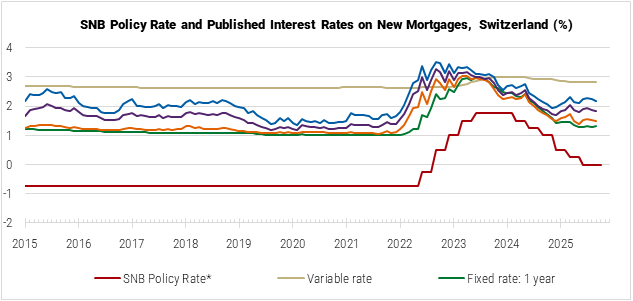
Note: *SNB policy rate applied from June 2019; for prior periods, the SNB target for the three-month Swiss franc Libor is displayed
Data Source: SNB.
Published interest rates on new mortgage loans:
| Avg Interest Rate, September 2025 |
YoY | Avg Interest Rate, September 2024 |
YoY | Avg Interest Rate, September 2023 |
|
| Variable rate | 2.81% | ↓ | 2.94% | ↓ | 2.97% |
| SARON-linked rate: 3-year maturity | 1.07% | ↓ | 2.09% | ↓ | 2.67% |
| SARON-linked rate: 5-year maturity | 1.08% | ↓ | 2.12% | ↓ | 2.71% |
| SARON-linked rate: unlimited maturity | 1.13% | ↓ | 2.12% | ↓ | 2.74% |
| Fixed rate: 1-year maturity | 1.32% | ↓ | 1.84% | ↓ | 2.84% |
| Fixed rate: 5-year maturity | 1.50% | ↓ | 1.76% | ↓ | 2.83% |
| Fixed rate: 10-year maturity | 1.83% | ↓ | 1.91% | ↓ | 2.97% |
| Fixed rate: 15-year maturity | 2.18% | ↑ | 2.14% | ↓ | 3.09% |
| Data Source: SNB. | |||||
Lower interest rates continue to support solid increases in mortgage lending. According to the central bank's data, 44,607 new mortgage loans amounting to CHF 39.98 billion (USD 49.13 billion) were advanced in H1 2025, showing an 11.2% increase in volume and a 9.0% increase in the total value of new lending compared to the same period last year. Both indicators, however, are still below the peak levels observed in 2021.
Of the newly originated mortgages during this period, the largest share was represented by owner-occupied residential properties of households (49.9%), the remaining amount split between rental properties of households (16.6%), rental properties of companies (16.7%), and other types of mortgages (16.8%). The most pronounced growth in new loan value (17.5% year-on-year) was observed in the owner-occupied residential properties category.
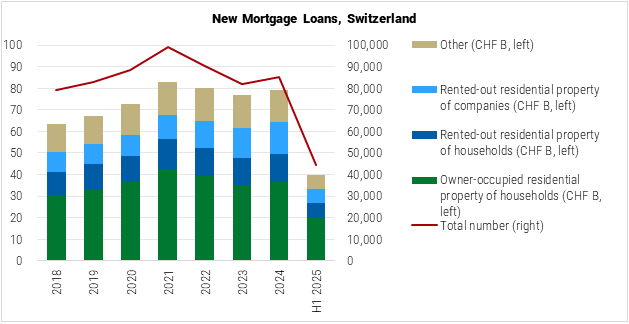
Data Source: SNB.
The total value of mortgage claims held by banks in Switzerland continues to grow steadily. In 2024, it expanded by 3.2%, following a 2.3% increase in 2023, 3.7% in 2022, and 3.4% in 2021.
As of September 2025, the mortgage stock stood at CHF 1.26 trillion (USD 1.58 trillion).
Sized against the Swiss economy, the mortgage market moderated from the pandemic-related 156.1% spike in the ratio of outstanding loans to GDP at current prices in 2020 to an estimated 148.1% in 2024. The ratio, however, continues to trend upward in the long term, compared to around 136% a decade ago and around 118% two decades ago.
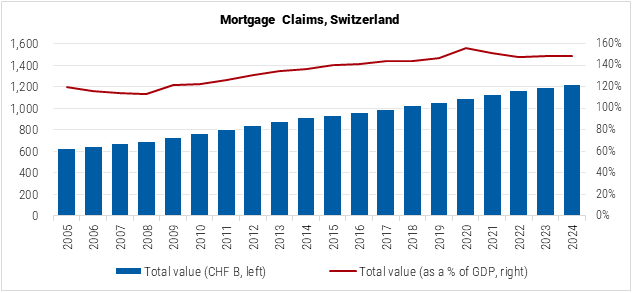
Data Sources: SNB, SECO.
Socio-Economic Context:
US Tariffs Weigh on Growth, Foreign Migration Moderates
Uncertainty surrounding international trade and economic policy continues to shape the outlook for the Swiss economy. The country's real GDP growth previously accelerated somewhat from 0.7% in 2023 to 1.4% in 2024, but has since slowed to below-average levels, affected by tariff increases on exports to the US, which account for around 10% of Switzerland's total exports. The latest European Commission projections see the economy expanding by 1.2% in 2025 and 1.3% in 2026, which is largely in line with the forecast from the International Monetary Fund (IMF), expecting 0.9% and 1.3% growth in the respective periods.
The fall 2025 economic forecast from the State Secretariat for Economic Affairs (SECO), however, based on recently revised GDP data and the assumption that international tariffs will remain at current levels, expects an even more pronounced slowdown next year, projecting growth at 1.3% in 2025 and 0.9% in 2026.
"Since 7 August, imports from Switzerland have been subject to additional US tariffs of 39% instead of the previous 10%, with certain exceptions. In addition, most other US trading partners face lower tariffs, placing Swiss exporters at a competitive disadvantage in the US market. Finally, the Swiss franc has appreciated in recent months," the SECO release explained. "The additional tariffs are placing a heavy burden on affected sectors and export-oriented companies, with significant ripple effects expected across the broader economy. Moreover, persistent uncertainty is also dampening economic activity."
In line with slower growth, the consumer price index (CPI) inflation in the country continued to ease, falling from 2.1% in 2023 to 1.1% in 2024 and, most recently, reported by the FSO at just 0.1% in October 2025. The indicator is expected to remain subdued through the rest of 2025 and 2026, reflecting lower international energy prices and the strength of the Swiss currency. The IMF expects the annual inflation level to reach 0.1% in 2025 and 0.6% in 2026, while the SECO forecast expects 0.2% and 0.5% for the respective periods.
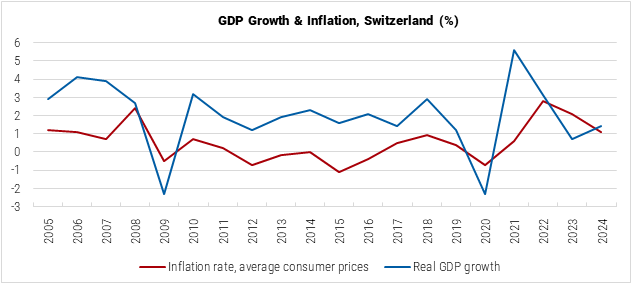
Data Source: IMF.
Sluggish economic growth is also affecting the Swiss labor market. The Q3 2025 bulletin from the SNB mentions stagnation in employment and increased unemployment, while difficulties in recruiting staff reported by the Swiss companies eased further. According to the figures reported by the SECO, in October 2025, the nationwide unemployment rate reached 2.9%, up from 2.5% and 2.0% during the same period in 2024 and 2023, respectively. The authority's most recent forecast expects the indicator to rise from an average level of 2.9% in 2025 to 3.2% in 2026.
"Although still close to its 10-year average, the upward trend in unemployment reflects further softening in labor demand," commented the 2025 Article IV staff report from the IMF. "Real wages likely remained positive given the disinflationary environment, but employment prospects weakened."
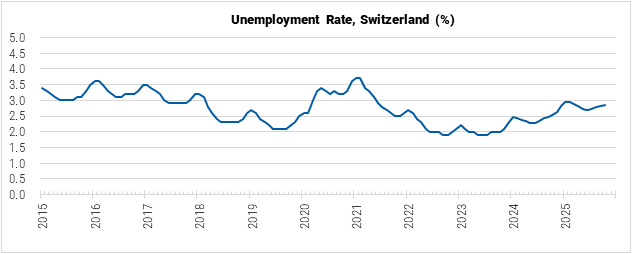
Data Source: SECO via FSO.
While dropping from the peak level of 139.1 thousand people in 2023 to 82.8 thousand people in 2024, the net migration to Switzerland remains historically high, contributing to the labor force growth and helping to counter the declines in the domestic population. Over the last 30 years, the foreign population (including stateless persons and other non-Swiss categories) permanently residing in Switzerland grew from about 953 thousand in 1984 to nearly 2.5 million in 2024, its share in the total population increasing from 14.8% to 27.4%.
In the nine months of 2025, however, the State Secretariat for Migration (SEM) reported net foreign migration of permanent residents at 49.9 thousand, compared to 58.2 thousand during the same period last year (-14.3%), indicating further moderation of the trend.
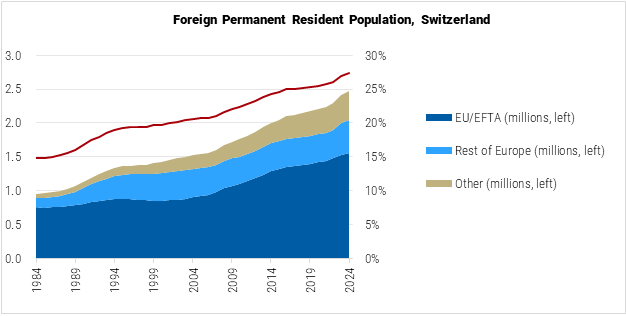
Data Source: FSO.
In general, the Swiss economy remains highly resilient, supported by strong institutions, prudent policies, and a skilled labor force, as outlined in the IMF staff report. At the same time, it continues to experience headwinds from a number of internal and external factors, including demographic trends, skills gaps, global uncertainty, trade fragmentation, and intensified safe-haven flows that challenge Switzerland's export-oriented growth model. According to experts, the economy's near-term growth is likely to remain below potential, with a gradual recovery anticipated through 2030.
Sources:
- Swiss National Bank (SNB)
- SNB Data Portal: https://data.snb.ch/
- Real Estate Price Indices: https://data.snb.ch/
- Foreign Exchange Rates - Month: https://data.snb.ch/
- Monetary Policy Assessment of 25 September 2025: https://www.snb.ch/
- Quarterly Bulletin 3/2025: https://www.snb.ch/
- Federal Statistical Office (FSO)
- Gross Domestic Product: https://www.bfs.admin.ch/
- Consumer Prices: https://www.bfs.admin.ch/
- Population Statistics: https://www.bfs.admin.ch/
- Components of Population Change: https://www.bfs.admin.ch/
- International Migration: https://www.bfs.admin.ch/
- Foreign Permanent Resident Population Change: https://www.bfs.admin.ch/
- Situation on the Labor Market in October 2025 (FR): https://www.bfs.admin.ch/
- Dwellings Statistics: https://www.bfs.admin.ch/
- Empty Dwellings Census: https://www.bfs.admin.ch/
- Rented Dwellings: https://www.bfs.admin.ch/
- Tenants/Owners: https://www.bfs.admin.ch/
- Federal Office for Housing (FOH)
- Reference Interest Rate (FR): https://www.bwo.admin.ch/
- Tenancy Law (FR): https://www.bwo.admin.ch/
- Housing policy (FR): https://www.bwo.admin.ch/
- Housing Market Overview, Q3 2025 (FR): https://www.bwo.admin.ch/
- The Federal Council
- Popular Vote on 24 November 2024: https://www.admin.ch/
- News Service Bund of the Swiss Government
- The Federal Council Amends the OBLF to Increase the Transparency of Rental Leases (FR): https://www.news.admin.ch/
- State Secretariat for Economic Affairs (SECO)
- Economic Forecasts: https://www.seco.admin.ch/
- Gross Domestic Product Quarterly Data: https://www.seco.admin.ch/
- State Secretariat for Migration (SEM)
- Foreigners Statistics (FR): https://www.sem.admin.ch/
- Federal Office of Justice (FOJ)
- Acquisition of Property by Foreign Non-Residents: https://www.bj.admin.ch/
- Publication Platform for Federal Law (Fedlex)
- Federal Act on the Acquisition of Immovable Property in Switzerland by Foreign Non-Residents: https://www.fedlex.admin.ch/
- Swiss Tenants' Association (Asloca)
- ASLOCA Draws a Positive Conclusion: the Rent Initiative is on the Right Track (FR): https://www.asloca.ch/
- International Monetary Fund (IMF)
- Country Overview: Switzerland: https://www.imf.org/
- 2025 Article IV Staff Report: https://www.imf.org/
- European Commission
- Autumn 2025 Economic Forecast, EFTA: https://economy-finance.ec.europa.eu/
- Wüest Partner
- Property Market Switzerland 2025 | 4: https://www.wuestpartner.com/
- Property Market Switzerland 2024 | 4: https://www.wuestpartner.com/
- UBS
- UBS Swiss Real Estate Bubble Index 3Q 2025: https://www.ubs.com/
- Switzerland Real Estate Outlook - Edition 2H25: https://www.ubs.com/
- Switzerland Real Estate Outlook 2H2025: https://www.ubs.com/
- Mortgage Interest Rates: Interest Rate Forecast and Trend: https://www.ubs.com/
- PWC
- PwC Immospektive, August 2025 (DE): https://www.pwc.ch/
- Julius Bär
- Property Market Report Switzerland, Q3 2025: https://www.juliusbaer.com/
- Raiffeisen Switzerland
- Real Estate Switzerland - Q4 2025 (DE): https://www.raiffeisen.ch/
- Fitch Ratings
- Fitch Affirms Switzerland at 'AAA'; Outlook Stable: https://www.fitchratings.com/
- Reuters
- Swiss Voters Reject More Powers for Landlords on Subletting: https://www.reuters.com/
- RTS
- L'Asloca Launches an Initiative to Counter Rising Rents (FR): https://www.rts.ch/